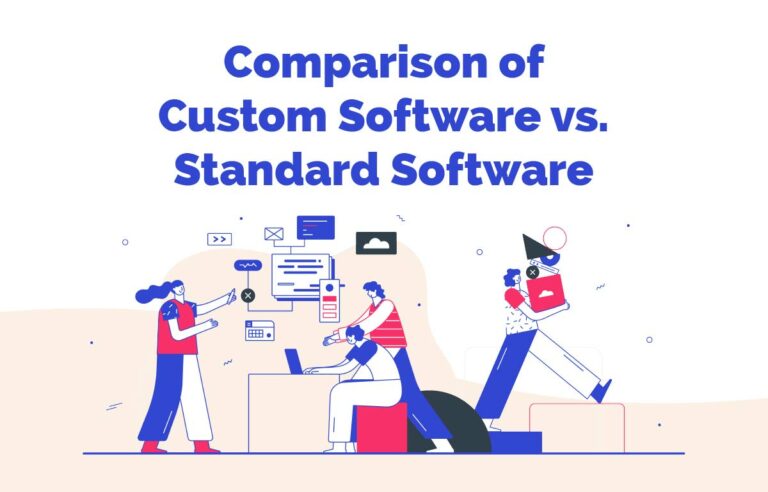Comparison of In-House Development vs. Software Development Outsourcing
Basis for decision – which approach is the right one for a specific application
»

The most important in a nutshell
Choose In-house Development if:
- You want to have complete control over a project or
- You already have or want to build up a team for your project.
Choose Outsourcing if:
- You want access to innovative technology and top engineering talent.
- You lack in-house experts and need a fast time to market.
- You want to start working on the project right away.
- You need predictable costs with predictable outcomes.
- You need your team to focus on their existing work
Are you trying to figure out whether you should outsource your next software development project to a 3 rd party supplier, or have it done in-house? Be reassured, you’re not alone. In this insight article, we take a deeper look at the pros and cons of each decision path, so you can make an informed decision about what’s best for your next project.
What is In-House Development?
In-House development, also known as insourcing, is the process of building software with internal experts in your company. Developers, requirement engineers, devops, software architects, designers and project managers are employed by you and perform their assigned tasks.
If you don’t have those specialists on board yet, you must carry out appropriate recruitment to create your dedicated team. However, if you have the right people in place, in-house development can be a great way to get your software project off the ground.
The success of this approach depends solely on you and your team.
Advantages of In-House Development
Full control over the team
Full control over the team makes it easier to observe work progress and supervise project implementation. The team’s schedule can also be controlled by the employer, ensuring everyone is available to collaborate at the same time. All of these factors contribute to a more efficient and cohesive working environment.Seamless collaboration through face-to-face communication
Collaborating with in-house developers face-to-face is less burdensome and more accessible than collaborating with outsourced developers. You can meet with your colleagues with minimal delay to discuss issues, conceptualize your ideas on whiteboards and move forward. Direct communication is more prone to miscommunication and can thus eliminate mistakes caused by misunderstanding.A better understanding of your company’s values
Your company values flexibility and dedication. By having in-house developers, everyone working on projects is likely to share the same values and is more invested in the company’s success. In-house developers are more aware of the company’s needs and can adapt faster to changes. They are also dedicated to the project and have better communication between all parties involved. This makes them a great asset to your company.Protection from external access
You can protect your company from external access by not giving anyone outside your company access to your infrastructure, intranet, portals, and especially sensitive data.Opportunity to develop new skills in-house
Every new project is a chance to improve your team’s skills. Training them in new techniques and technologies will help them improve their work. By keeping things in-house, you can all learn together, become more capable as a team, leading to higher retention. Investing in new skills for your team pays off in the long run.Disadvantages of In-House Development?
Higher costs of building and maintaining an in-house team
Loyalty to your company and the cultural fit can also come at a price. Hiring and maintaining an In-House Development team is expensive and requires more time than outsourcing project work. Of course, hourly rates of an outsourcing contractor may be more expensive than your own hourly compensations. But in return, contractors also only bill you for the time they spend working on your project. If you employ an in-house team, you have to pay for the hours they spend on administrative work, their training, paid holidays, paid sick days and payroll taxes. You also need to consider the general costs of organizing their work.Lack of necessary skills
It is important to have the necessary skills in order to complete a project successfully. It always takes more than one good software developer to form a team and thus successfully develop projects in-house. Depending on the scope of your project, you need a balanced team of backend and frontend developers, at least one software architect, UX designer, devops, quality engineers and project manager to get you off the ground.Longer time until market launch
Hiring employees can be a very time-consuming process, especially if you don’t have easy access to a comprehensive talent base. Between a limited talent pool and the total cost of full-time employees, you will drain a lot of your resources on the recruitment process, instead of kickstarting your project.Risk of burning your team
Time pressure and a possible lack of expertise can lead to burning out your team, which is neither productive nor beneficial. You should only resort to overtime in rare cases.Advantages of In-House Development
- Full control over the team
- Seamless collaboration through face-to-face communication
- Better understanding of your company’s values
- Protection from external access
- Opportunity to develop new skills in-house
Disadvantages of In-House Development
- Higher costs of building and maintaining an in-house team
- Lack of necessary skills
- Longer time until market launch
- Risk of burning your team

What Is Software Development Outsourcing?
When you outsource software development, you commission a specific project or task – which is called outtasking – to a workforce outside of your organization. Such companies are usually technology experts who offer not only product development, but also consultations and advising services.
On paper, the outsourcing of IT Services sounds like an ideal option. You get to choose between a wide variety of experts in the field from every corner of the world. However, there are outsourcing advantages and disadvantages to keep in mind in order to manage your expectations.
Advantages of Software Development Outsourcing
Enlarging and downsizing of teams anytime
The greatest advantage of working with an external outsourcing partner is the ability to scale your team up or down very easily. This can be done at any time during your development project. Working with an external outsourcing team doesn’t require any hiring or firing. Scaling this way doesn’t reflect poorly on you as an employer or hurt your company’s brand.Access to the right skill set
Custom Software Development Outsourcing agencies provide access to unique talent and industry experts. Businesses can fill gaps in their in-house teams without having to sacrifice quality by settling for developers with less experience or the need to hire full time for negligible project timeframes.Cost effectiveness through selected services
When you outsource, you only pay for the services you need. You can easily scale your project up or down depending on your budget and needs. And if your existing outsourcing partner becomes too expensive, you can always switch to a cheaper option.Increased efficiency through proven workflows
Outsourcing companies have delivered many projects and can retrospect on experiences with many different clients. They can not only implement processes that have been proven to work within a certain industry, but they will also increase speed of development and quality of your final product.Faster time to market
Sometimes you just need to get a project completed quickly. With a team of experts in a particular field, you can start working on a project right away. You do not have to recruit specialists to your team, waste time on training and optimize your own development processes before starting work. Moreover, by working with trusted specialists, you can rely on their experience and efficiency.Focus on your core competencies
If you are not a software company, outsourcing to experts opens spaces for key aspects of your digital product like marketing, client specs, branding, customer relations and support.Disadvantages of Software Development Outsourcing
Before you decide to take the outsourcing route, risks of outsourcing you’d be wise to keep in mind:
Potential communication problems
Working with an external team can be difficult, as communication via phone, email, Slack or other instant messaging can be less effective than in person. This can lead to misunderstandings resulting in slowed down velocity and solutions that do not fit your expectations. Your partner company should speak the same language or at least very good English and live in the same cultural area.
Feeling of devaluation and decreased moral
Outsourcing can have a negative effect on your company culture. In-house employees may see outsourcing as a threat to their role within the organization. When employees feel like they’re being replaced, it can lead to a feeling of devaluation and decreased morale. The consequence can be decreased productivity and reluctance to integrate an external partner into your team. Leadership and management need to be clear about the reasons for outsourcing, the benefits it will bring, and how it will impact employees.
Different business expectations between you and the contractor
A contractor might not be as committed to your business as you are to yours. They might not be as invested in the project’s outcome and might leave before you’re satisfied, get distracted or simply not put in the maximum amount of work possible.
Advantages of Software Development Outsourcing
- Enlarging and downsizing of teams anytime
- Access to the right skill set
- Cost effectiveness through selected services
- Increased efficiency through proven workflows
- Faster time to market
- Focus on your core competencies
Disadvantages of Software DevelopmentOutsourcing
- Potential communication problems
- Feeling of devaluation and decreased moral
- Different business expectations between you and the contractor
When to outsource
- You need a fast time to market.
- You want access to innovative technology and top engineering talent
- You want to start working on the project right away without needing to recruit, train or implement the right people to your team.
- You need predictable outcomes with a predictable budget that are covenant.
- Lack of in-house expertise and access to the right skills for projects.
- Your team needs to stay focused and you’re on a tight budget.
When to go in-house
If outsourcing is applicable in situations where you need short term help with experts not yet available in your team, handling projects in-house better fits in the following situations:
- You want to have complete control over a project, this is especially important if you’re not sure about what you want when you start. You think you’ll need help with maintaining your project in the future. Then consider completing it with your in-house team. This will ensure that there is always someone available to help you with any issues that may arise.
- You want to keep a secret strategy or business decisions confidential,
- You want to enhance the skills of your in-house teams by training them through challenges on new projects.
?
Are there any open questions whether you should go in-house or work together with an external partner?
We are here to help you. Talk to our experts and get a free consultation.

